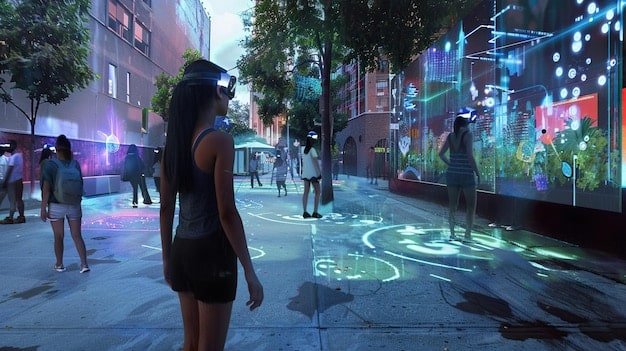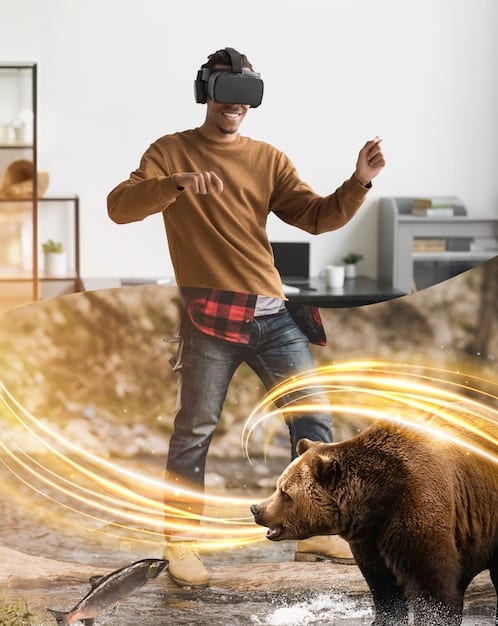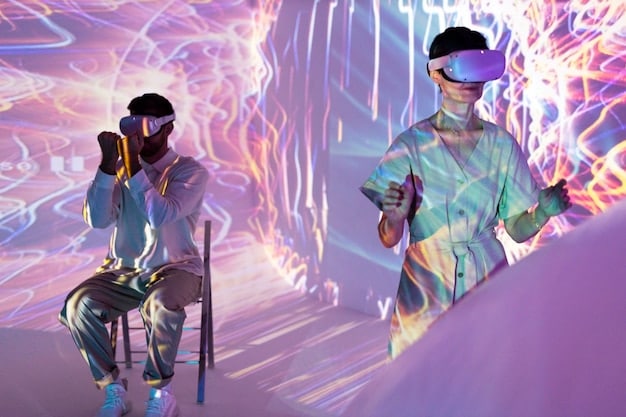Metaverse Frontier: US Startups Shaping Virtual Worlds ($5B Market)

The Metaverse Frontier is being shaped by innovative US startups that are developing immersive experiences and virtual worlds, tapping into a projected $5 billion market through cutting-edge technologies and creative applications.
The **Startup Spotlight: The Metaverse Frontier: US Startups Building Immersive Experiences and Virtual Worlds with a Projected $5 Billion Market** is rapidly evolving, driven by innovative startups across the United States. These companies are at the forefront of creating immersive experiences and virtual worlds that are poised to capture a significant share of a projected $5 billion market.
Exploring the Metaverse Landscape: Key US Startups
The metaverse is no longer a futuristic concept; it’s a rapidly developing reality. Several US startups are leading the charge, crafting engaging and interactive virtual environments that are attracting significant investment and user adoption. These companies are leveraging technologies like virtual reality (VR), augmented reality (AR), and blockchain to deliver unique experiences.
These startups are not only building virtual worlds but also creating the tools and infrastructure necessary for others to participate. From developing intuitive creation platforms to designing advanced avatar systems, their innovations are democratizing access to the metaverse.
What Defines a Metaverse Startup?
A metaverse startup typically focuses on building or enhancing virtual worlds and immersive experiences. These companies often incorporate cutting-edge technologies to create innovative and engaging environments.
Key Characteristics of Successful Metaverse Startups:
- Innovative Use of Technology: Leveraging VR, AR, AI, and blockchain for unique experiences.
- Strong Community Building: Creating platforms that encourage user interaction and content creation.
- Focus on User Experience: Designing intuitive and immersive interfaces.
- Scalability: Developing infrastructure that can support a growing user base.
These characteristics enable metaverse startups to stand out in a competitive landscape and attract both users and investors. By focusing on innovation, community, and scalability, they are well-positioned to capitalize on the growing metaverse market.
In conclusion, US startups are pivotal in shaping the metaverse, employing advanced technologies and fostering vibrant communities to drive growth and innovation. Their commitment to improving user experience and scalability ensures their continued success in this dynamic digital landscape.
VR and AR Pioneers: Creating Immersive Realities
Virtual reality (VR) and augmented reality (AR) technologies are foundational to the metaverse. US startups specializing in these areas are pushing the boundaries of what’s possible, creating immersive experiences that blur the lines between the physical and digital worlds. These innovations are finding applications across various sectors, from gaming and entertainment to education and training.
These companies are developing both the hardware and software required to deliver seamless and compelling VR/AR experiences. Their advancements in display technology, motion tracking, and spatial audio are enhancing user immersion and engagement.

Examples of Pioneering VR/AR Startups:
Several US startups are making notable contributions to the VR/AR space. These companies are developing solutions for a wide range of applications, from enterprise training to consumer entertainment.
- Spatial: Building collaborative VR/AR workspaces for enhanced remote teamwork.
- Magic Leap: Developing advanced AR headsets for enterprise and consumer applications.
- Oculus (Meta): Creating VR hardware and software for gaming, social interaction, and more.
- Sandbox VR: Offers fully immersive and social VR experiences in a physical space.
These startups are transforming how we interact with technology, creating new opportunities for learning, collaboration, and entertainment. By pushing the boundaries of VR and AR, they are paving the way for a more immersive and connected future.
Ultimately, VR and AR pioneers are vital to metaverse development, crafting immersive realities that redefine interaction and application across numerous industries. Their pursuit of enhancement and innovation ensures their continued impact in shaping the digital future.
Gaming and Entertainment: The Metaverse as a Playground
Gaming and entertainment are natural fits for the metaverse, offering opportunities for immersive storytelling, interactive experiences, and social interaction. US startups in this space are developing virtual worlds and games that are attracting millions of players and viewers. These platforms are becoming fertile ground for experimentation and innovation in metaverse applications.
These startups are not only creating engaging games but also building platforms that allow users to create their own content and experiences. This user-generated content model is fostering creativity and driving the growth of the metaverse ecosystem.
Popular Metaverse Gaming Platforms:
Several platforms have gained significant traction in the metaverse gaming space. These platforms offer a diverse range of experiences, from traditional video games to interactive virtual worlds.
- Roblox: A user-generated gaming platform with millions of active users creating and playing games.
- Epic Games (Fortnite): Hosting virtual concerts, events, and interactive experiences within the popular game.
- Decentraland: A decentralized virtual world where users can buy, sell, and develop virtual land.
These platforms are blurring the lines between gaming and social interaction, creating vibrant online communities. By empowering users to create and share their own content, they are fostering a sense of ownership and participation in the metaverse.
To summarize, the integration of gaming and entertainment within the metaverse provides unprecedented opportunities for immersive storytelling and social interaction, with many US startups driving these innovations. By enabling user-generated content, they’re promoting a dynamic environment that propels metaverse expansion.

Social Interaction and Community Building in Virtual Spaces
The metaverse offers new ways for people to connect, collaborate, and build communities. US startups are developing platforms and tools that facilitate social interaction in virtual spaces, enabling users to form relationships, share experiences, and participate in shared activities. These social platforms are becoming vital for fostering a sense of belonging in the metaverse.
These startups are focusing on creating intuitive and engaging social experiences that replicate the dynamics of real-world interactions. From virtual meeting spaces to shared interest groups, they are providing users with opportunities to connect with others who share their passions and goals.
Key Features of Effective Metaverse Social Platforms:
Several key features contribute to the success of social platforms in the metaverse. These features focus on facilitating interaction, building community, and providing users with engaging experiences.
- Avatar Customization: Allowing users to create unique virtual representations of themselves.
- Spatial Audio: Simulating realistic soundscapes for more immersive conversations.
- Interactive Activities: Providing shared experiences like games, concerts, and workshops.
- Community Moderation: Implementing tools to ensure a safe and inclusive environment.
These features enhance the sense of presence and connection in virtual spaces, encouraging users to form lasting relationships and build vibrant communities. By prioritizing user experience and safety, these platforms are fostering a positive and engaging metaverse culture.
In conclusion, US startups are integral in enhancing social interactions within the metaverse by developing platforms that foster connections and shared experiences. By promoting safety and providing engaging events, they contribute significantly to a vibrant community within the digital world.
The Economic Impact: Virtual Commerce and NFTs
The metaverse is creating new economic opportunities for creators, businesses, and consumers. US startups are developing virtual commerce platforms and non-fungible token (NFT) marketplaces that are enabling the creation, sale, and exchange of digital assets. These innovations are driving economic growth and creating new revenue streams in the metaverse.
These startups are building secure and transparent platforms that allow users to buy, sell, and trade virtual goods and services. From virtual real estate to digital art, they are creating new asset classes and investment opportunities in the metaverse.
Understanding Virtual Commerce and NFTs:
Virtual commerce refers to the buying and selling of goods and services within virtual worlds. NFTs are unique digital assets that represent ownership of virtual or physical items.
Examples of Metaverse Commerce Platforms:
Several platforms are leading the way in metaverse commerce and NFT marketplaces. These platforms offer a diverse range of virtual assets and economic opportunities.
- OpenSea: A leading NFT marketplace for buying and selling digital art, collectibles, and virtual items.
- Sandbox: A virtual world where users can buy, sell, and develop virtual land using the SAND cryptocurrency.
- Decentraland: A decentralized virtual world with a thriving economy based on the MANA cryptocurrency.
These platforms are empowering creators to monetize their work and enabling consumers to own and trade unique digital assets. By fostering a vibrant virtual economy, they are driving innovation and growth in the metaverse.
Overall, US startups are spearheading virtual commerce and NFT adoption within the metaverse, fostering economic growth and enabling new revenue streams. By constructing secure platforms, they are empowering creators and consumers to participate in a dynamic digital economy.
Challenges and Opportunities for US Metaverse Startups
While the metaverse presents vast opportunities, US startups also face several challenges. Overcoming these challenges will be crucial for realizing the full potential of the metaverse and building a sustainable ecosystem. Addressing issues such as interoperability, user safety, and ethical considerations is vital for fostering trust and adoption.
These startups are working to address these challenges through technological innovation, policy advocacy, and community engagement. Their efforts are shaping the future of the metaverse and ensuring that it is a safe, inclusive, and equitable space for all.
Key Challenges for Metaverse Startups:
Several key challenges must be addressed to ensure the long-term success of metaverse startups. These challenges include technological hurdles, regulatory uncertainties, and ethical considerations.
- Interoperability: Lack of seamless integration between different virtual worlds.
- User Safety: Protecting users from harassment, fraud, and other online harms.
- Ethical Considerations: Addressing issues such as data privacy, digital identity, and algorithmic bias.
- Scalability issues: Infrastructure challenges to support massive user bases.
Addressing these challenges requires collaboration between startups, policymakers, and the broader metaverse community. By working together, they can create a framework that promotes innovation while safeguarding user interests and ethical standards.
In summary, while US metaverse startups face hurdles such as scalability issues and ethical concerns, they are actively pursuing innovative solutions and collaborative efforts. These endeavors aim to guarantee that the metaverse is a secure and equitable environment for all, fostering ethical standards and protecting user interests.
The Future of the Metaverse: Predictions and Trends
The metaverse is still in its early stages of development, but it has the potential to transform many aspects of our lives. US startups are playing a crucial role in shaping the future of the metaverse, driving innovation and setting the stage for new applications and experiences. Looking ahead, several key trends and predictions are emerging, pointing to the transformative power of the metaverse.
These startups are pushing the boundaries of what’s possible, creating new opportunities for connection, collaboration, and commerce in the digital realm. Their vision and innovation will shape the future of the metaverse and redefine how we interact with technology.
Emerging Trends in the Metaverse:
Several key trends are shaping the development of the metaverse. These trends include increased adoption of VR/AR technologies, the rise of decentralized platforms, and the integration of the metaverse with other technologies like AI and blockchain.
- VR/AR Integration: Greater use of VR and AR devices for immersive experiences.
- Decentralization: Increased adoption of blockchain-based platforms for greater user control.
- AI Integration: Leveraging AI to create more intelligent and personalized virtual environments.
These trends suggest that the metaverse will become more immersive, decentralized, and intelligent in the years to come. By embracing these trends, US startups can position themselves at the forefront of the metaverse revolution.
To conclude, US startups are vital in shaping the future of the metaverse, spearheading integration and personalization efforts. By focusing on these trends, they are set to lead the ongoing metaverse revolution, transforming digital experiences and setting new landmarks.
| Key Point | Brief Description |
|---|---|
| 🚀 VR/AR Pioneers | Startups creating immersive realities with VR and AR technologies. |
| 🎮 Gaming & Entertainment | Metaverse as a playground for interactive and immersive experiences. |
| 🤝 Community Building | Enhancing social interaction in virtual spaces. |
| 💰 Economic Impact | Virtual commerce and NFTs creating new economic opportunities. |
FAQ
▼
The metaverse is a network of 3D virtual worlds focused on social connection. It’s important because it offers new ways to interact, work, and play, potentially transforming many aspects of our lives and creating significant economic opportunities.
▼
Key technologies include virtual reality (VR), augmented reality (AR), blockchain, and artificial intelligence (AI). These technologies enable immersive experiences, secure transactions, and personalized environments within the metaverse.
▼
US startups are developing innovative platforms, virtual commerce solutions, and social experiences. They are pushing the boundaries of what’s possible, creating new opportunities for connection, collaboration, and economic growth in the digital realm.
▼
Challenges include ensuring interoperability between different virtual worlds, protecting users from online harms, addressing ethical considerations like data privacy, and managing scalability issues to support massive user bases effectively.
▼
Future trends include increased adoption of VR/AR devices, the rise of decentralized platforms powered by blockchain, and greater integration of artificial intelligence (AI) to personalize virtual environments increasingly.
Conclusion
US startups are at the vanguard of the metaverse, developing virtual worlds, immersive realities, and digital commerce platforms. These companies are driving innovation and shaping the future of how we interact, engage, and transact in the digital world, promising significant growth and transformation ahead.





